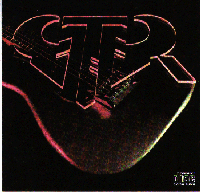
Album: GTR
Artist: GTR
1986 Arista
CD Germany: 258 980
Band members:
Max Bacon: lead vocals
Steve Hackett: guitar, synthesizer, vocals
Steve Howe: guitar, synthesizer, vocals
Jonathan Mover: drums, percussion
Phil Spalding: bass, vocals
Produced by Geoffrey Downes
Tracks:
Side A:
1. "When the Heart Rules the Mind" [Hackett/Howe] (5:29)
2. "The Hunter" [Downes] (4:58)
3. "Here I Wait" [Hackett/Howe] (4:57)
4. "Sketches in the Sun" [Howe] (2:33)
5. "Jekyll and Hyde" [Hackett/Howe/Bacon] (4:44)
Side B:
6. "You Can Still Get Through" [Hackett/Howe] (4:58)
7. "Reach Out (Never Say No)" [Hackett/Howe/Spalding] (4:06)
8. "Toe the Line" [Hackett/Howe] (4:30)
9. "Hackett to Bits" [Hackett] (2:10)
10. "Imagining" [Hackett/Howe/Mover] (5:53)
Notes: (****) Brian Lane put Howe and Hackett together. The band's
big hit, (1), was supposedly written by the pair within 24 hours of
meeting. Hackett recommended Mover for the band. Bacon had sung for
Nightwing, who had opened for Hackett. The single and album sold
well, if not as well as Asia. However, it's also famous for JD
Considine's review of the album in Musician magazine, which
consisted of only one word: "SHT".
Spalding talked about the band in a May 2020 episode of The Hustle
podcast. He had been a Yes fan at school. He'd known Mover for some
years, and Mover suggested him to the band. The band failed to sign
to Geffen: Lane blamed Bacon and Spalding for getting uproariously
drunk at a dinner meeting with them. Spalding felt that Arista, the
eventual label, was pressuring the band for Asia-like hits. Spalding
said the only complete songs when they started recording
were (2) and (8), with everything else being developed by the band
in rehearsals. (I presume he's not including the two "solo" pieces,
(4) and (9).) He said that he, Bacon and Mover could have been
credited more given their significant arrangement input.
Spalding and Bacon worked extensively on backing vocal arrangements
with the producer, Downes; Spalding lays credit to the backing vocal
arrangement on (6). Various parts were programmed by Downes,
including coming up with a percussion part for (6). Mover and
Spalding came up with the middle section of (10); Spalding also
arranged the end of the song, coming up with the chord inversions.
(4) and (9) showcased the two Steves separately with 2 solo pieces,
although Spalding/Mover do also play on (9).
Spalding put the band's short-lived nature down to the band being
too small for both Howe and Hackett, but not in terms of their egos.
He praised Howe for being down to Earth. He also talked in the
podcast about his substance abuse in the period.
The band did start work on a second album. Spalding and Bacon wrote
some songs that were rejected. But the band was falling apart and
Hackett and Howe were to split. As this was happening, Spalding lost
a baby son at 1 day of age during this time and, in his own words,
hit the bottle and cocaine hard. Howe, Bacon, Spalding and Mover
continued to work together, although Mover was then replaced by
Nigel Glockner. Robert Berry later joined too. At the same Lane
brought Berry to this project, he was also introducing Berry to
Keith Emerson, which led to the band 3. But Arista wouldn't accept a
band without the 2 star guitarists. 5 songs Howe, Bacon and Spalding
worked on were eventually released on Howe's Anthology 2. The name Nero Trend
has often been associated with these post-GTR sessions, but Spalding
explains that Brian Lane had set up a company to process the last
GTR advance from Arista ($200,000), the previous company having gone
bankrupt, and it was that that was called Nero Trend. Bacon used
some of the post-GTR material on a solo album: Spalding was
uncertain in the podcast interview, but thought Hackett had sued him
over this.
Bacon, Spalding and Downes went on to work on Mike Oldfield's Islands
(1987); Spalding worked with Oldfield for several years. (HP, 6 Jun
20)
Return to Home Page
